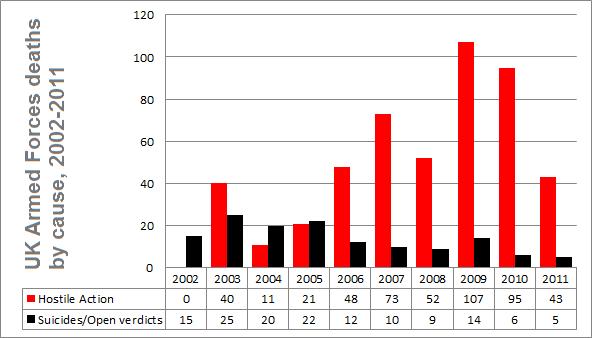Do more Armed Forces personnel die by suicide than in battle?
On Armed Forces day over the weekend, Respect party leader Salma Yaqoob tweeted what she claimed was the harsh truth about troops in Afghanistan - that more soldiers die by suicide than die in battle following service in Afghanistan.
Her comments provoked a number of followers to ask where the figuresto back the claim up could be found, with one claiming that they were 'inaccurate'.
So is there any basis to her claims?
Analysis
It isn't clear from Ms Yaqoob's statement whether she is talking about UK Armed Forces alone or if she is also including troops from other nations fighting in Afghanistan, such as those of the United States. Statistics from the Pentagon, for instance, confirm that active-duty suicides in the US outnumber combat deaths in 2012. Perhaps more shockingly, the US Department of Defense estimates that 18 US Armed Forces veterans die by suicide every day.
Full Fact tried to get in touch with Ms Yaqoob and Respect about the claim but we are still waiting for a response, so we can't confirm her sources. The US case lends credence to her position although it isn't specified which deaths by suicide involve those who served in Afghanistan.
For now, it's interesting to investigate the UK case to see if there is any evidence closer to home.
UK Armed Forces in Afghanistan
The problem we first encounted when looking at Ms Yaqoob's claim at face value is that it is difficult to link deaths specifically to Afghanistan. Data is available both for suicides and combat deaths, but finding suicide rates specific to those involved in Afghanistan (termed 'Operation Herrick') is more difficult to track down.
A parliamentary answer from 2009 gives some indication, however. When asked how many active service personnel were known to have died by suicide following service in Afghanistan, the Government confirmed three cases of known suicide for those who served in Afghanistan, along with two others whose deaths were likely to have been by suicide.
At time of writing, there have been 422 British fatalities in Afghanistan, seven more than recorded by the latest official figures from the Defence Analytical Services Agency (which was last updated to 31 May 2012). Of the 415 on record, 328 were killed in action and 47 died of wounds.
So taking Afghanistan in isolation shows far more personnel deaths in action than by any other measured cause. However this excludes suicides by veterans who have left the Services - which could be what Ms Yaqoob was referring to.
Ex-Service Personnel
A seminal piece of research on suicide following departure from the UK armed forces was conducted in 2009 by the Centre for Suicide Prevention at the University of Manchester.
The well-reported study found that, of the 234,000 people who had left the UK Armed Forces between 1996 and 2005, 224 had died by suicide.
Unfortunately it is difficult to match this data to other figures that might reveal how this compares to deaths in active service. What we do know from the Defence Analytical Services Agency is that between 2002 and 2005 72 service personnel were killed by hostile action.
So while these figures might add credence to Ms Yaqoob's claim, there isn't enough here for us to say conclusively that it is true.
UK Armed Forces as a whole
Returning to the Defence Analytical Services Agency provides us with statistics on the causes of death across the entire UK Armed Forces, regardless of where they served. Here we can determine the number of deaths, by cause, in the regular Armed Forces since 2002:

Deaths by hostile action alone by far outstrip those by suicide, although interestingly this wasn't the case before 2005.
However we can be more precise than this. A parliamentary answer from 20 June this year gives figures for known suicides and open verdicts (deaths treated as suspicious and included in suicide statistics) in each year since 1992.
This data confirms that, since 1992, a total of 452 service personnel have died by suicide or had an open verdict declared. In the same period, 3,559 have died in total (including suicides), although we can't tell how many of these were by hostile action prior to 2002.
Conclusion
It is difficult to evaluate Salma Yaqoob's claim, not only because of the sparse and fragmented data on the topic, but also because it could be interpretted in many different ways.
If the United States Armed forces were included in the comparison, for example, there would be little difficulty in standing the claim up.
However the figures we do have indicate that, in the UK case, deaths in 'battle' or in action more generally by far outweigh those recorded by suicide, although this only applies to serving personnel.
When factoring in the greater unknown of those who have left the military the case is less clear-cut. The 2009 study indicated that suicides were more likely among ex-service personnel than serving members, but it is difficult to match this data to Afghan veterans specifically, and makes for an awkward comparison with the data we have on casualties in action.
Update (3 July 2012)
Salma Yaqoob has been in touch with Full Fact and confirmed that she was referring to US troops returning from Afghanistan, not UK personnel. She cited the same source used in this article to support this claim.
In addition, she also cited the study discussed in this article which showed that some former Service personnel were three times more likely to die by suicide than the general population. However, this doesn't compare these veteran suicides with those killed in active combat and is only true for those under 25 anyway.
However, she did cite the more convincing case of the Falklands War, in which the BBC reported in 2002 that veteran suicides outnumbered combat deaths, according to a veterans support group. We haven't yet checked this particular claim.